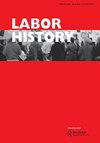探索网络和知识的力量:社会资本和教育如何推动中国农民工在劳动力市场上的成功
IF 0.7
4区 管理学
Q1 HISTORY
引用次数: 0
摘要
摘要本研究探讨了社会资本、教育、收入与农民工就业稳定性之间的关系,这是一个研究较少的领域。我们的研究结果揭示了社会资本、正规教育持续时间、收入和农民工工作稳定性之间存在很强的正相关。重要的是,我们区分了男性和女性移民,揭示了社会资本和教育对收入和工作稳定性影响的性别差异。男性农民工受益于社会资本和正规教育,而女性农民工主要受益于正规教育。在工作稳定性方面,只有女性农民工的正规教育年限表现出显著的相关性。此外,我们的分析考察了代际差异,表明正规教育对所有农民工都有积极影响,年轻人的优势更为明显。此外,我们的研究强调了社会资本在增加制造业和建筑业农民工收入方面的作用,同时也增强了建筑业和服务业农民工的工作稳定性。在制造业、建筑业和服务业中,正规教育成为农民工收入和工作稳定性的积极因素。关键词:社会资本、就业收入、工作稳定、中国农民工、诱惑、就业部门披露声明作者未发现潜在利益冲突。由于数据的限制,这里的“服务”包括批发/零售贸易和住宅服务/维修。本文其他地方的“服务”还包括运输/仓储/邮政服务和住宿/餐饮。附加信息国家自然科学基金资助项目[No. 1];72203240和编号:[CSQ21003]作者简介杨正毅,经济管理专业副教授。主要研究方向为中国农民工劳动经济史。王宇,运营管理助理教授。他的研究兴趣集中在医疗保健行业容量、服务质量和服务可及性之间的权衡。本文章由计算机程序翻译,如有差异,请以英文原文为准。
Exploring the power of networks and knowledge: how social capital and education drive the success of Chinese migrant workers in the labor market
ABSTRACTThis study explores the relationships between social capital, education, income, and job stability in Chinese migrant workers, an under-researched area. Our findings reveal strong positive links between social capital, formal education duration, income, and job stability for migrant workers. Importantly, we distinguish between male and female migrants, unveiling gender-specific differences in the impact of social capital and education on income and job stability. Male migrant workers benefit from both social capital and formal education, while female migrant workers primarily gain from formal education. Regarding job stability, only the formal education duration of female migrant workers demonstrates a noteworthy correlation. Additionally, our analysis examines generational disparities, showing that formal education positively affects all migrant workers, with more pronounced advantages among younger individuals. Furthermore, our study emphasizes the role of social capital in increasing income for migrant workers in the manufacturing and construction sectors, while also enhancing job stability among those in the construction and service sectors. Formal education emerges as a positive factor for both income and job stability across manufacturing, construction, and service domains among migrant workers.KEYWORDS: Social capitalemploymentincomejob stabilityChinese migrant workerseducationemployment sector Disclosure statementNo potential conflict of interest was reported by the authors.Notes1. Due to limitations in data, ‘service’ in this context encompasses wholesale/retail trade and residential services/repair. ‘service’ elsewhere in this paper also includes transportation/warehousing/postal services and accommodation/catering.Additional informationFundingSupported by the National Natural Science Foundation of China [No. 72203240 and No. CSQ21003]Notes on contributorsZhengyi YangZhengyi Yang is an associate professor in economic management. Her research interests are focused upon the labor economic history of migrant workers in China.Yu WangYu Wang is an assistant professor of operations management. His research interests center on the tradeoffs between capacity, service quality, and service accessibility in the healthcare industry.
求助全文
通过发布文献求助,成功后即可免费获取论文全文。
去求助
来源期刊

Labor History
Multiple-
CiteScore
1.00
自引率
28.60%
发文量
44
期刊介绍:
Labor History is the pre-eminent journal for historical scholarship on labor. It is thoroughly ecumenical in its approach and showcases the work of labor historians, industrial relations scholars, labor economists, political scientists, sociologists, social movement theorists, business scholars and all others who write about labor issues. Labor History is also committed to geographical and chronological breadth. It publishes work on labor in the US and all other areas of the world. It is concerned with questions of labor in every time period, from the eighteenth century to contemporary events. Labor History provides a forum for all labor scholars, thus helping to bind together a large but fragmented area of study. By embracing all disciplines, time frames and locales, Labor History is the flagship journal of the entire field. All research articles published in the journal have undergone rigorous peer review, based on initial editor screening and refereeing by at least two anonymous referees.
 求助内容:
求助内容: 应助结果提醒方式:
应助结果提醒方式:


